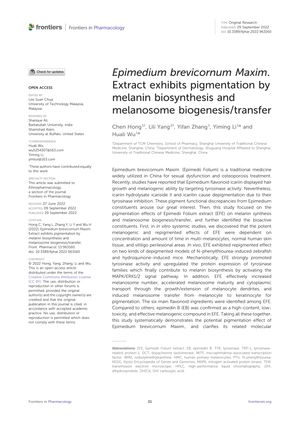Epimedium Brevicornum Maxim Extract Enhances Melanin Biosynthesis and Melanosome Biogenesis/Transfer
September 2022
in “
Frontiers in pharmacology
”
Epimedium brevicornum Maxim. Epimedii Folium extract EFE melanin synthesis melanosome biogenesis melanosome transfer melanocytes tyrosinase activity tyrosinase protein expression MAPK/ERK1/2 signaling pathway epimedin B hypopigmentation disorders Epimedium Epimedium extract melanin production melanosome formation melanosome movement skin cells tyrosinase enzyme tyrosinase protein MAPK/ERK pathway EB skin pigmentation disorders

TLDR Epimedium extract helps increase skin pigmentation and could be a new treatment for conditions with reduced pigmentation.
The study investigated the pigmentation effects of Epimedii Folium extract (EFE) from the traditional Chinese medicine Epimedium brevicornum Maxim. on melanin synthesis and melanosome biogenesis/transfer. In vitro studies showed that EFE had concentration and time-dependent melanogenic and repigmenting effects on melanocytes, human skin tissue, and vitiligo perilesional areas. In vivo, EFE caused repigmentation in zebrafish and mice models with induced depigmentation. The extract was found to enhance tyrosinase activity, upregulate tyrosinase protein expression, and activate the MAPK/ERK1/2 signaling pathway, leading to increased melanin biosynthesis. Additionally, EFE increased melanosome numbers, maturity, and transfer to keratinocytes through melanocyte dendrite growth. Among the six main flavonoid ingredients identified in EFE, epimedin B (EB) was highlighted as a high-content, low-toxicity, and effective melanogenic compound. The study provides insights into the pharmacology of Epimedium and suggests a potential new treatment for hypopigmentation disorders.



